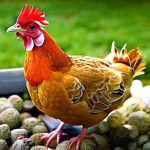Guard geese are an effective and natural method for protecting chickens from predators such as raccoons and possums. These large birds are known for their territorial behavior and aggressive response to potential threats, making them well-suited for safeguarding chicken coops. Unlike guard dogs, which are commonly used for livestock protection, guard geese require minimal maintenance while providing comparable security benefits.
Additionally, they offer companionship and entertainment for the chickens, contributing to a more harmonious and secure environment for the flock. The use of guard geese for protecting livestock and property has a long history dating back centuries. Their loud vocalizations and aggressive demeanor serve as powerful deterrents to potential predators.
Guard geese possess a keen sense of awareness, allowing them to detect threats from afar. These birds are also highly intelligent and can be trained to respond to specific commands, enhancing their adaptability and reliability as a security measure for chickens. As the demand for natural and sustainable livestock protection methods increases among farmers and homesteaders, guard geese have become increasingly popular due to their effectiveness and low-maintenance requirements.
Table of Contents
- 1 The Role of Guard Geese in Protecting Chickens
- 2 Understanding the Threat of Raccoons and Possums
- 3 How Guard Geese Deter Raccoons and Possums
- 4 Tips for Introducing Guard Geese to a Chicken Coop
- 5 Potential Challenges and Considerations
- 6 The Benefits of Guard Geese for Chicken Protection
- 7 FAQs
- 7.1 What are guard geese?
- 7.2 Do guard geese keep raccoons and possums away from chickens?
- 7.3 How do guard geese protect chickens from raccoons and possums?
- 7.4 Are guard geese a humane and effective alternative to other predator control methods?
- 7.5 What are some considerations to keep in mind when using guard geese for predator control?
Key Takeaways
- Guard geese are an effective and natural way to protect chickens from predators.
- Raccoons and possums pose a significant threat to chickens and their eggs.
- Guard geese use their honking and aggressive behavior to deter raccoons and possums.
- Introducing guard geese to a chicken coop should be done gradually and with care.
- While guard geese can be effective, there are potential challenges and considerations to keep in mind, such as the temperament of the geese and their compatibility with other animals.
The Role of Guard Geese in Protecting Chickens
Keen Senses and Early Warning Systems
In addition to their protective instincts, guard geese also have keen senses that allow them to detect potential threats from a distance, giving them the ability to alert the chickens and other animals on the farm of impending danger.
Guard geese also provide companionship and social interaction for the chickens, creating a sense of community and security within the flock. Their presence can help reduce stress and anxiety in the chickens, leading to healthier and more productive birds.
Adaptability and Trainability
In addition, guard geese are highly adaptable and can be trained to respond to specific commands, making them an effective and reliable form of protection for chickens. Overall, guard geese play a vital role in creating a safe and secure environment for chickens, allowing them to thrive without the constant threat of predators.
Understanding the Threat of Raccoons and Possums

Raccoons and possums are common predators that pose a significant threat to chickens and other small livestock. Raccoons are known for their intelligence and dexterity, allowing them to easily bypass traditional coop defenses such as locks and latches. They are also nocturnal animals, making it difficult for farmers to monitor and protect their chickens during the night.
Possums, on the other hand, are opportunistic feeders that will prey on chickens if given the chance. Their ability to climb and squeeze through small openings makes them a persistent threat to chicken coops, often causing significant damage and loss of livestock. Both raccoons and possums are known carriers of diseases such as rabies and parasites that can pose a risk to both humans and animals.
Their presence on a farm can lead to significant economic losses and emotional distress for farmers and homesteaders. As such, it is crucial for farmers to take proactive measures to protect their chickens from these predators in order to ensure the safety and well-being of their livestock.
How Guard Geese Deter Raccoons and Possums
Guard geese are highly effective at deterring raccoons and possums from approaching a chicken coop. Their territorial nature and aggressive behavior serve as a powerful deterrent to potential predators, making them think twice before attempting to approach the coop. The loud honking of guard geese serves as an alarm system, alerting both the chickens and the farmer of any potential threats.
In addition, guard geese have keen senses that allow them to detect predators from a distance, giving them the ability to respond quickly and effectively. The presence of guard geese also creates a sense of community and security within the flock, reducing stress and anxiety in the chickens. This not only leads to healthier and more productive birds but also helps deter predators by presenting a united front against potential threats.
Guard geese are also highly adaptable and can be trained to respond to specific commands, making them an effective and reliable form of protection for chickens. Overall, guard geese are an invaluable asset in deterring raccoons and possums from approaching a chicken coop, providing a natural and sustainable form of protection for livestock.
Tips for Introducing Guard Geese to a Chicken Coop
Introducing guard geese to a chicken coop requires careful planning and consideration to ensure a smooth transition for both the geese and the chickens. It is important to gradually introduce the geese to the coop, allowing them time to acclimate to their new surroundings and establish a bond with the chickens. Providing separate living quarters for the geese initially can help reduce any potential conflicts with the chickens while allowing them to become familiar with each other’s presence.
It is also important to provide ample space for the geese to roam and forage, as they are naturally active birds that require plenty of room to move around. This can help reduce any potential aggression or territorial behavior towards the chickens while allowing the geese to fulfill their natural instincts. Additionally, providing enrichment such as ponds or pools can help keep the geese occupied and content, reducing any potential stress or boredom that may lead to aggressive behavior towards the chickens.
Finally, it is important to monitor the interactions between the geese and the chickens closely, intervening if any conflicts arise. Providing positive reinforcement through treats or praise can help encourage positive interactions between the two species, creating a harmonious environment within the coop. With careful planning and consideration, introducing guard geese to a chicken coop can be a successful endeavor that provides natural protection for the entire flock.
Potential Challenges and Considerations

Territorial Nature and Aggression
One challenge is the territorial nature of guard geese, which can lead to aggression towards other animals or even humans if they feel threatened or provoked. It is important for farmers to establish clear boundaries with the geese and provide ample space for them to roam in order to reduce any potential conflicts.
Noise Level and Local Regulations
Another consideration is the noise level of guard geese, as their loud honking can be disruptive in certain environments. Farmers should consider the proximity of their neighbors and any local noise ordinances when introducing guard geese to their farm. Additionally, it is important for farmers to be aware of any local regulations or restrictions regarding the keeping of geese on their property in order to ensure compliance with local laws.
Long-term Care and Maintenance
Finally, it is important for farmers to consider the long-term care and maintenance of guard geese, as they require adequate food, water, shelter, and veterinary care in order to thrive. Farmers should be prepared to invest time and resources into caring for their guard geese in order to ensure their health and well-being. With careful planning and consideration of these potential challenges, guard geese can be a valuable asset in protecting chickens from predators on the farm.
The Benefits of Guard Geese for Chicken Protection
In conclusion, guard geese are a natural and effective way to protect chickens from predators such as raccoons and possums. Their territorial nature, aggressive behavior, and keen senses make them an invaluable asset in deterring potential threats from approaching a chicken coop. In addition to their protective instincts, guard geese provide companionship and social interaction for the chickens, creating a sense of community and security within the flock.
While there are some potential challenges and considerations when introducing guard geese to a chicken coop, with careful planning and consideration, they can be successfully integrated into the farm environment. Overall, guard geese offer a natural and sustainable form of protection for chickens that allows them to thrive without the constant threat of predators. As more farmers seek alternative methods for protecting their livestock, guard geese have gained popularity for their effectiveness and ease of care, making them an ideal choice for safeguarding chickens on the farm.
If you’re considering using guard geese to protect your chickens from predators like raccoons and possums, you may also want to explore the idea of keeping guinea fowl with your chickens. According to a recent article on PoultryWizard, guinea fowl are known for their ability to alert chickens to potential threats and can help keep predators at bay. To learn more about the benefits of keeping guinea fowl with chickens, check out this article.
FAQs
What are guard geese?
Guard geese are domesticated geese that are trained to protect a property or livestock from potential threats such as predators. They are known for their loud honking and aggressive behavior towards intruders.
Do guard geese keep raccoons and possums away from chickens?
Yes, guard geese are effective at keeping raccoons and possums away from chickens. Geese are naturally territorial and will aggressively defend their territory, making them a deterrent to potential predators.
How do guard geese protect chickens from raccoons and possums?
Guard geese use their loud honking and aggressive behavior to scare off raccoons and possums. Their presence alone can be enough to deter these predators from approaching the chicken coop.
Are guard geese a humane and effective alternative to other predator control methods?
Yes, guard geese are considered a humane and effective alternative to other predator control methods such as traps or chemical deterrents. They rely on natural instincts and behavior to protect the chickens, without causing harm to the predators.
What are some considerations to keep in mind when using guard geese for predator control?
It’s important to consider the temperament of the geese and their compatibility with other animals on the property. Additionally, proper training and socialization of the geese is essential to ensure they are effective at protecting the chickens.
Meet Walter, the feathered-friend fanatic of Florida! Nestled in the sunshine state, Walter struts through life with his feathered companions, clucking his way to happiness. With a coop that’s fancier than a five-star hotel, he’s the Don Juan of the chicken world. When he’s not teaching his hens to do the cha-cha, you’ll find him in a heated debate with his prized rooster, Sir Clucks-a-Lot. Walter’s poultry passion is no yolk; he’s the sunny-side-up guy you never knew you needed in your flock of friends!







